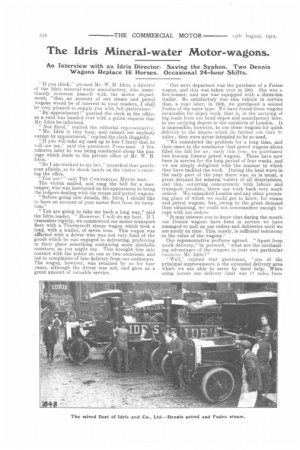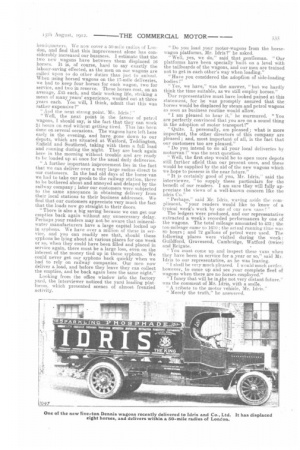The Idris Mineral-water Motor-wagons.
Page 8

Page 9

If you've noticed an error in this article please click here to report it so we can fix it.
An Interview with an Idris Director. Saving the Syphon. Two Dennis Wagons Replace 16 Horses. Occasional 24-hour Shifts.
'• If you think,'phoned Mr. W. H. Idris, a director of the Idris mineral-water manufactory, who immediately concerns himself with the motor department, "that an account of our steam and petrol wagons would be of interest to your readers, I shall be very pleased to supply you with full particulars." By appointment?" queried the clerk in the office, as a card was handed over with a polite request that Mr. Idris be informed.
" Not fixed," replied the editorial representative. "Mr. Idris is very busy, and cannot see anybody except by appointment," replied the clerk doggedly. " If you will take my card up to him I fancy that he will see me," said the persistent Press-man. A few minutes later he was being conducted along the passage which leads to the private office of Mr. W. H. Idris.
"So I am tracked to my lair," remarked that gentleman affably, as he shook hands on the visitor's entering the office.
'You are ! " said TnE COMMERCIAL MOTOR man.
The victim smiled, and rang the bell for a messenger, who was instructed on his appearance to bring the ledgers dealing with the steam and petrol wagons. "Before going into details, Mr. Idris, I should like to have an account of your motor fleet from its inception."
"You are going to take me back a long way," said the Idris leader. " However, I will do my best. If I remember rightly, we commenced our motor-transport fleet with a Thornycroft steam wagon which took a load, with a trailer, of seven tons. This wagon was afflicted with a driver who was not very fond of the goods which he was engaged in delivering, preferring in their place something containing more alcoholic moisture, as you might say. This brought him into contact with the police on one or two occasions, and led to complaints of late delivery from our customers. The wagon, however, was retained by us for four years, although the driver was not, and gave us a great amount of valuable service. "Our next departure was the purchase of a Foden wagon, and this was taken over in 1905. She was a five-tonner, and she was equipped with a three-ton trailer. So satisfactory was this vehicle in service that, a year later, in 1906, we purchased a second Foden of the same type. We have found these wagons invaluable for depot work, that is, in the carrying of big loads from our head depot and manufactory here, to our outlying depots in the outskirts of London. It is impossible, however, to use these wagons for quick delivery to the depots which lie farther out than 20 miles ; they were never intended to be so used.
"We considered the problem for a long time, and then came to the conclusion that petrol wagons about filled the bill for us ; early this year, we purchased two five-ton Dennis petrol wagons. 'These have now been in service for the long period of four weeks, and we are simply delighted with the manner in which they have tackled the work. During the heat wave in the early part of the year there was, as is usual, a great demand for mineral waters of all descriptions, and this, occurring concurrently with labour and transport troubles, threw our work back very much indeed. We ransacked London and any other prornising place of which we could get to know, for steam and petrol wagons, but, owing to the great demand then obtaining, we could not commandeer enough to cope with our orders. "It may interest you to know that during the month our Dennis wagons have been in service we have managed to pull up our orders and deliveries until we are nicely on time. This, surely, is sufficient testimony to the value of the wagons."
Our representative perforce agreed. "Apart from quick delivery," he pursued, "what are the outstanding advantages of the wagons in your own particular business. Mr. Idris ?"
"Well," replied that gentleman, " one of the principal improvements is the extended delivery area which we are able to serve by their help. When using horses our delivery limit was 17 miles from
headquarters. We now cover a50-mile radius of London, and find that this improvement alone has con siderably increased our business. 1 estimate that the two new wagons have between them displaced 16 horses. It is, of course, hard to say exactly the labour-saving effected, as the men on our wagons are called upon to do other duties than just to unload. When using horsed wagons on the 17-mile deliveries, we had to keep four horses for each wagon, two for service, and two in reserve. These horses cost., on an average, £45 each, and their working life, striking a mean of many years' experience, worked out at three years each, You will, I think, admit that this was rather expensive ?"
" And the next strong point, 'Mr. Idris !
" Well, the next point in the favour of petis.,1 wagons, I should say, is the fact that they can work
24 hours on end without getting tired. This has been done on several occasions. The wagons have left here early in the evening, and have gone down to our depots, which are situated at Watford, Teddington, Enfield and Southend, taking with them a full load and running during the night. They are back again here in the morning without trouble and are ready to be loaded up at once for the usual daily deliveries, "A further important improvement lies in the fact that we can deliver over a very large radius direct to our customers. In the bad old days of the horse-van we had to take our goods to the railway station, there to he bothered about and annoyed and delayed by the railway company ; later our customers were subjected to the same annoyance in obtaining delivery from their local stations to their business addresses. We find that our customers appreciate very much the fact that the loads now go straight to their doors.
"There is also a big saving because we can get our empties back again without any. unnecessary delay.
Perhaps your readers may not be aware that mineral water manufacturers have a large capital locked up in syphons. We have over a million of these in ser vice, and you can readily see that, should these syphons be lying about at various places for one week or so, when they could have been filled and placed in service again, there must be a large loss, even on the interest of the money tied up in these syphons. We could never get our syphons back quickly when we had to rely on railway companies. Our men now deliver a load, and before they leave they can collect the empties, and be back again here the same night." Looking from the office window into the factory yard, the interviewer noticed the yard loading plat forms, which presented scenes of almost frenzied activity. "Do you load your motor-wagons from the horse-. wagon platforms, Mr. Idris?" he asked.
"Well, yes, we do," said that gentleman. "Our platforms have been specially -built on a level with the tailboards of the wagons, and our men are trained not to get in each other's way when loading."
"Have you considered the adoption of side-loading bodies ?"
Yes, we have," was the answer, "but we hardly think the time suitable, as we still employ horses,"
-Our representative must have looked pained at this statement, for he was promptly assured that the horses would be displaced by steam and petrol wagons as soon as business routine would allow.
"I am pleased to hear it," he murmured. "You are perfectly convinced that you are on a sound thing in the adoption of motor transport?" "Quite. I, personally, am pleased ; what is more important, the other directors of this company are pleased ; and, most important of all, is the fact that our customers too are pleased." "Do you intend to do all your local deliveries by motorvanl" was the next question.
" Well, the first step would be to open more depots still further afield than our present ones, and these would be supplied by the aid of the new wagons which we hope to possess in the near future." "It is certainly good of you, Mr. Idris," said the interviewer, "to supply these particulars for the benefit of our readers. I am sure they will fully appreciate the views of a well-known concern like the Idris Co."
"Perhaps," said Mr. Idris.. waving aside the compliment, "your readers would like to know of a typical week's work by one of our new vans '? " The ledgers were produced, and our representative extracted a week's recorded performances by one of the wagons. The total mileage amounted to 433; the ton-mileage came to 1610; the act ual running time was SO hours ; and 72 gallons of petrol were used. The following places were visited during the week : Guildford, Gravesend, Cambridge, Watford (twice) and Reiaate. • "You must come up and inspect these vans when they have been in service for a year or so," said Mr. Idris to our representative, as he was leaving. shall be very much pleased, Iuould much prefer, however, to come up and see your complete fleet of wagons when there are no horses employed."
"I fancy that will be infthe not very distant future." was the comment of Mr. Idris, with a smile.
" A tribute to the motor vehicle, Mr. Idris." " Merely the truth," he answered.






















